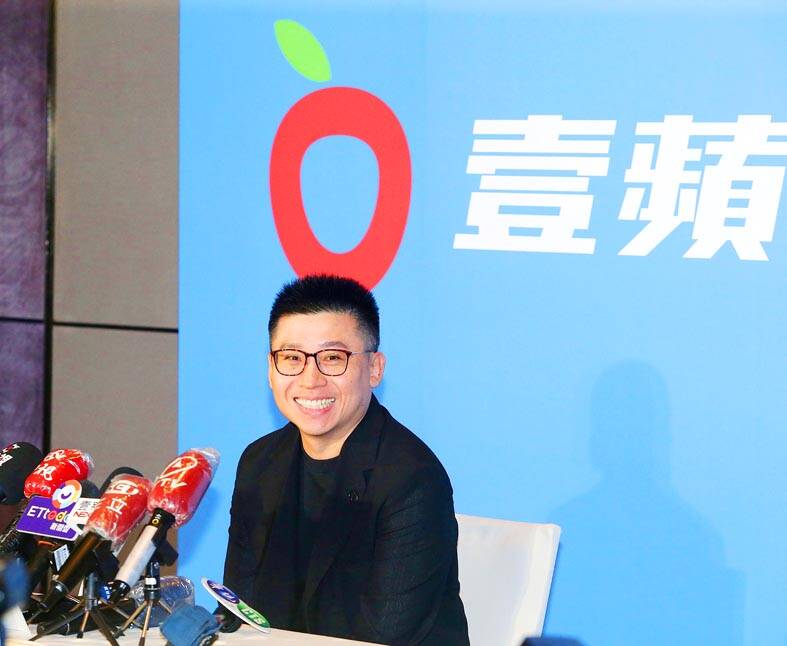Singaporean entrepreneur Joseph Phua (潘杰賢) yesterday said he is to launch a new publication with 96 percent of Apple Daily (Taiwan)’s original staff, as critics continued to call for government scrutiny.
Phua, founder of the streaming platform 17Live, held a news conference yesterday to announce the establishment of Next Apple News.
Phua vowed to refrain from using Apple Daily (Taiwan)’s brand, Web site and assets, and would not have access to personal information.

Photo: CNA
He also promised that Next Apple News would maintain neutrality and abide by the law.
The Web site of Apple Daily (Taiwan) — Apple Online — issued a statement yesterday, saying that it would stop updating content from 11:59pm today.
Apple Daily (Taiwan) said it was sorry that it had to bid farewell to its readers due to a lack of working capital, but added that Next Apple News would continue to shoulder the same responsibility to expose societal injustices.
It also invited people from different ideologies to share their advice with the new company.
“Every piece of your criticism will motivate Next Apple News to do better as it has been for Apple Daily (Taiwan) for the past 19 years,” the statement said.
Meanwhile, the Economic Democracy Union yesterday asked Apple Daily (Taiwan) to destroy its news material and draw up regulations regarding how personal information would be handled after the business closes.
It also called on the Ministry of Culture to supervise the process.
Apple Daily (Taiwan) in a statement on Wednesday last week said that personnel data would be archived for five to seven years before being destroyed, its fiscal and tax information would be archived for five to 10 years before being destroyed, and the data of its subscribers and members, as well as its news material, would be archived forever.
The union said that archiving is different from destroying, so the handling of Apple Daily (Taiwan) might potentially contravene Paragraph 3, Article 11 of the Personal Data Protection Act (個人資料保護法).
It would continue to monitor whether Phua and Next Apple News engage in illegal practices or hurt Taiwan’s democracy, it added.
Additional reporting by Chen Yu-fu

Taiwan has received more than US$70 million in royalties as of the end of last year from developing the F-16V jet as countries worldwide purchase or upgrade to this popular model, government and military officials said on Saturday. Taiwan funded the development of the F-16V jet and ended up the sole investor as other countries withdrew from the program. Now the F-16V is increasingly popular and countries must pay Taiwan a percentage in royalties when they purchase new F-16V aircraft or upgrade older F-16 models. The next five years are expected to be the peak for these royalties, with Taiwan potentially earning

STAY IN YOUR LANE: As the US and Israel attack Iran, the ministry has warned China not to overstep by including Taiwanese citizens in its evacuation orders The Ministry of Foreign Affairs (MOFA) yesterday rebuked a statement by China’s embassy in Israel that it would evacuate Taiwanese holders of Chinese travel documents from Israel amid the latter’s escalating conflict with Iran. Tensions have risen across the Middle East in the wake of US and Israeli airstrikes on Iran beginning Saturday. China subsequently issued an evacuation notice for its citizens. In a news release, the Chinese embassy in Israel said holders of “Taiwan compatriot permits (台胞證)” issued to Taiwanese nationals by Chinese authorities for travel to China — could register for evacuation to Egypt. In Taipei, the ministry yesterday said Taiwan

Taiwan is awaiting official notification from the US regarding the status of the Agreement on Reciprocal Trade (ART) after the US Supreme Court ruled US President Donald Trump's global tariffs unconstitutional. Speaking to reporters before a legislative hearing today, Premier Cho Jung-tai (卓榮泰) said that Taiwan's negotiation team remains focused on ensuring that the bilateral trade deal remains intact despite the legal challenge to Trump's tariff policy. "The US has pledged to notify its trade partners once the subsequent administrative and legal processes are finalized, and that certainly includes Taiwan," Cho said when asked about opposition parties’ doubts that the ART was

If China chose to invade Taiwan tomorrow, it would only have to sever three undersea fiber-optic cable clusters to cause a data blackout, Jason Hsu (許毓仁), a senior fellow at the Hudson Institute and former Chinese Nationalist Party (KMT) legislator, told a US security panel yesterday. In a Taiwan contingency, cable disruption would be one of the earliest preinvasion actions and the signal that escalation had begun, he said, adding that Taiwan’s current cable repair capabilities are insufficient. The US-China Economic and Security Review Commission (USCC) yesterday held a hearing on US-China Competition Under the Sea, with Hsu speaking on